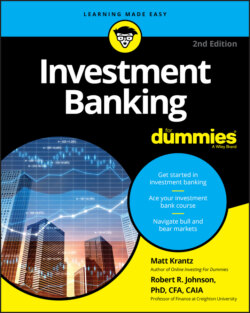Читать книгу Investment Banking For Dummies - Matthew Krantz - Страница 45
PRIVATE EQUITY: NOT THE TICKET TO RICHES
ОглавлениеPrivate equity firms had their absolute heyday in the mid-2000s. But they rose to prominence again in 2018 and 2019.
One of the key ingredients to private-equity firms is access to cheap money. And in the mid-2000s, private-equity firms could borrow from just about anyone with a pulse at extremely low interest rates. Banks and bond investors were more than willing to lend and buy bonds offering private-equity firms practically unlimited amounts of money to buy companies. Meanwhile, pension plans and other large institutions were lining up to invest in the private-equity firms’ investment funds used to hunt down and buy companies.
Some of the biggest LBOs of all time took place during the boom years of 2005, 2006, and 2007. Car rental firm Hertz, technology services firm SunGard Data Systems, retailer Toys “R” Us, and retailer Neiman Marcus were all bought up by private-equity firms in 2005.
The crescendo of the private-equity boom was capped off when one of the top LBO firms, Blackstone, decided to sell stock of itself in an IPO. Individual investors saw the IPO of Blackstone as a way to get on the inside track of the world of high finance. But how wrong they were. In fact, Blackstone was selling out at the peak of the LBO craze.
The company sold shares in an IPO at $31 a share on June 22, 2007. But individual investors who bought the deal were paying up just as the LBO business was about to hit a wall. Shortly after the IPO of Blackstone, the financial crisis of 2007 hit. Suddenly, banks were too nervous to lend to LBO firms, and bond investors didn’t want to lend money to the speculative ventures. Shares of Blackstone fell from $31 a share to less than $5 a share in early 2009.
But the story isn’t over. Interest rates fell again in 2019. The Federal Reserve cut short-term rates to stoke the economy. That is a green light, again, for private-equity firms like Blackstone. As of late 2019, shares of the private-equity firm were trading for more than $48 per share.
